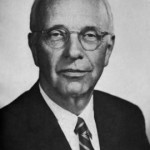 Historian: John King Fairbank
Historian: John King Fairbank
Nationality: American
Lived: 1907-1991
Profession(s): Writer, academic (Oxford, Harvard and others)
Books: The Great Chinese Revolution 1800-1985 (1986), China: A New History (1992).
Perspective: Western liberal
An outstanding history student at Exeter Academy, Fairbank’s thesis explored the Russian Revolution, while his first choice of specialisation was British history. By the late 1920s, he had developed an interest in Imperial and Republican China.
Fairbank travelled as a Rhodes scholar to Beijing, where he painstakingly taught himself to read and speak Chinese. He embarked on further study and research, including an examination of the recently opened Qing government archives. In 1936, he returned to Harvard, introduced courses on Chinese history and became America’s foremost expert on the subject.
In 1947 Fairbank, citing declining support for the Nationalists and corruption and disunity in their ranks, predicted the communists would eventually prevail in China. He expressed some sympathy for Mao Zedong and the CCP, suggesting that communism was “bad in America but good in China”.
After 1949, Fairbank urged Washington to recognise Mao’s government and work with them to advance American interests in the region. In the McCarthyism of the early Cold War, this was enough for Fairbank to be accused of communist sympathies and activity.
Historiographically, Fairbank became more a liberal realist than a leftist. He considered China, with its vast population and its late entry into the modern world, to be unique. Fairbank’s later histories were quite critical of Mao Zedong, yet provided sound explanations for how and why Mao was able to gain control of China.
Quotations
“Mao Zedong’s organisational principle was like that of any successful bandit: by force and guile, including a new teaching, to curry favour with the local people.”
“Mao Zedong’s rise to power reminds us of the founding of the Han, the Tang and the Ming [dynasties]. In each case, a band of leaders took shape and worked together under one top leader. Once formed, this leadership mobilised the populace in their area to support a military effort and either overthrow tyrants or expel foreigners from the land, in either case, a popular cause.”
“The Long March has always seemed like a miracle, more documented than Moses leading his chosen people through the Red Sea. How did so many troops and party organisers go so far on foot so fast? The answer, of course, is that only the leaders and a very small portion of the troops did go all the way.”
“Without the devastating Japanese invasion, the Nanjing government might gradually have led the way in China’s modernisation. As it turned out, however, resisting Japan gave Mao and the CCP their chance to establish a new autocratic power in the countryside, excluding the elements of a nascent urban civil society still developing under the Nationalists.”
“[Mao’s] application of Marxism-Leninism to China resulted in China’s having had 2,000 years of feudalism and only 40 years of capitalism. By European Marxist standards, China was peculiarly out of shape.”
“The methods whereby Mao’s thought reform movement was carried out at Yan’an in 1942-44 would become very familiar in CCP history.”
“The CCP was unexpectedly assisted by the operation of Heaven’s Mandate. They expected to have several years of further fighting before they could control all of China. But in fact, once they had defeated the [Guomindang], the whole country suddenly accepted them as the new authority.”
“The CCP generally feel that the first three years of their rule would be required for rehabilitation of the economy and mobilisation of the people before they could begin a transformation of society. But here, events went faster than they expected.”
“China’s intellectuals well knew that if you stick your neck out you may lose your head. For a year [of the Hundred Flowers campaign] they said nothing.”
“Because Mao had lost face by his trust in the Redness of intellectuals, he remained vindictively opposed to them, regarding them with disdain as mere word users and, with some fear, as people he could not control.”
“The logic of decentralised mobilisation led to the creation of People’s Communes, under which the benefits of modernisation in health care, education, large-scale production and the amenities of life were supposed to be distributed equally… Seldom has the willful pursuit of an ideal led to such devastating results.”
“By concentrating solely on Chairman Mao as the leader we would fail to convey the national mood of fervent self-sacrifice and frenetic activity that characterised the Great Leap Forward.”
“China’s political life, by including the peasantry, was brought down to the harsh and ignorant peasant level. This has occurred in other revolutions, as one of the costs of social change.”
“An outsider’s understanding of Mao requires a feat of imagination, first to recognise the nature of his supremacy. Mao had two careers, one as a rebel leader, one as an updated emperor. He had gained the power of the latter but evidently retained the self-image of the former.”
“Chairman Mao Zedong killed millions and millions of Chinese while calling it a class struggle for revolution.”
With the exception of material under Quotations, content on this page is © Alpha History 2018.
Content created by Alpha History may not be copied, republished or redistributed without our express permission. For more information please refer to our Terms of Use.
This website uses pinyin romanisations of Chinese words and names. Please refer to this page for more information.
